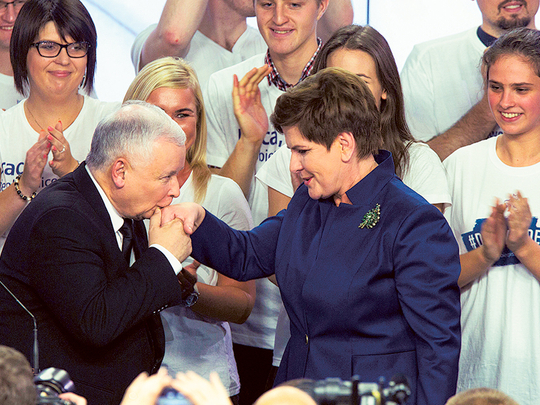
Warsaw: Poland’s conservative Law and Justice party was on course Monday for a massive general election victory, ending eight years of centrist rule in a win that risks inflaming tensions with the EU and Russia.
The eurosceptic PiS led by Jaroslaw Kaczynski is heading for an outright majority, according to projections from partial results, ousting leftist parties from parliament for the first time since the fall of communism in 1989.
“This is the first time in the history of Polish democracy that a single party has scored (an overall) majority” in the Sejm, the lower house, Kaczynski said in a victory speech after Prime Minister Ewa Kopacz conceded defeat.
Headlines Monday reflected the scale of the victory, with the centre-left daily Gazeta Wyborcza saying “PiS takes all” despite having campaigned against the party, deeming its promises of generous social benefits too good to be true.
The Polish edition of Newsweek — which has also been critical of PiS — slapped a picture of Kaczynski with a crown on his head on its cover, writing that he is “very close to seizing absolute authority in Poland”.
Kaczynski did not run for prime minister but is expected to call the shots in the next government, which he has signalled could be headed by Beata Szydlo, a coalminer’s daughter who ran a victorious presidential campaign in May.
He thanked Szydlo in his victory speech and also paid tribute to his identical twin brother, the late president Lech Kaczynski, who died in a 2010 plane crash in Smolensk, western Russia.
“Without him, we wouldn’t be here today. His spirit is stronger than his body,” the former child actor said of his twin, with whom he founded the party.
Kaczynski’s platform played strongly on fears arising from Europe’s worst migrant crisis since Second World War and analysts said a PiS government was likely to reverse Kopacz’s decision to accept refugees.
Kaczynski claimed refugees were bringing “cholera to the Greek islands, dysentery to Vienna, various types of parasites,” in comments that critics said recalled the Nazi era.
He insists Warsaw should financially support EU efforts to tackle the crisis but not take in refugees - a view surveys suggest is shared by nearly 60 percent of Poles.
“After eight years in opposition, Kaczynski is making a big comeback,” Warsaw political analyst Eryk Mistewicz told AFP.
Poland has become an east European heavyweight after a quarter century of explosive growth and vastly-improved living standards since the fall of communism.
But although the EU member’s economy is forecast to expand by 3.5 percent this year and next, and joblessness recently fell below 10 percent, many voters are fed up, believing time and money have been wasted.
The governing Civic Platform (PO) also never recovered from a 2014 eavesdropping scandal that discredited high-profile government ministers.
The departure last year of party leader Donald Tusk to the post of EU Council president set the centrists adrift.
According to projections from the independent Ipsos pollsters Monday, the PiS scored 232 out of 460 seats in the lower house of parliament, ousting the PO liberals, who took 137 seats. Smaller parties including the anti-establishment movement of rocker Pawel Kukiz took the rest.
Szydlo, 52, has pledged to lower the pension age, introduce generous family benefits, and impose taxes on banks and foreign-owned hypermarkets while cutting taxes for small and medium-sized enterprises.
Her populist-oriented promises targeted the core conservative electorate in the poorer, devoutly Catholic east and public sector workers, but critics warn the moves could destabilise robust public finances.
The right-wing PiS last held power in 2005-7, when Kaczynski governed with his identical twin.
That era was marked with internal political turmoil, triggered by the brothers’ combative style and international tensions brought on by their anti-German and anti-Russian views as well as a row with the EU over Poland’s weighting in the bloc’s decision-making.
“We might now see a ‘Kaczynski 2.0’,” Mistewicz told AFP, signalling the PiS leader may tone down his politics.
“Rather than aggressively locking horns with the EU, he will look for ways to extract maximum benefit from it. With Russia, he may also forego confrontation.”
Analysts agree the PiS will still anchor Poland’s security policy in Nato and strong US ties as a buffer against any threat from Russia.
It will seek ways to continue heavy reliance on coal at upcoming global climate talks, and joining the eurozone will remain a distant prospect.











